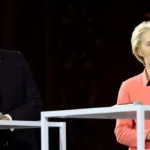
Peter Mandelson Fired as UK Ambassador Amid Jeffrey Epstein Scandal: Key Facts and Reactions
Peter Mandelson, a veteran Labour politician and the UK’s former ambassador to the United States, was dismissed in 2025 following revelations of his extensive and controversial relationship with the late convicted sex offender Jeffrey Epstein. New evidence revealed by British media exposed emails showing Mandelson’s supportive correspondence with Epstein, even after Epstein pleaded guilty to sex crimes involving minors. This scandal not only ended Mandelson’s diplomatic role but also ignited fierce political debates in Britain about ethics, transparency, and accountability at the highest levels of government.
Background: The Mandelson-Epstein Connection
Key Revelations
Peter Mandelson, once a pivotal figure in the Labour Party’s rise under Tony Blair, came under scrutiny after a “birthday book” surfaced. This book contained a personal note from Mandelson calling Epstein his “best pal” in 2003, years before Epstein’s sex offenses were publicly known. The situation worsened with the release of private emails in 2025, exposing Mandelson advising Epstein on legal strategies to seek early release from prison after his 2008 conviction for soliciting underage prostitution. Mandelson’s emails expressed deep personal affection and support, stating, “I think the world of you and feel hopeless and furious about what has happened.”
Political Career at Stake
Though Mandelson was known for his political resilience having survived previous scandals—this association with Epstein proved irreversible. He was appointed UK ambassador to the US in 2025 by Prime Minister Keir Starmer, who initially expressed full confidence in him. However, as fresh evidence surfaced and public scrutiny intensified, the Foreign, Commonwealth and Development Office disclosed that the scope of Mandelson’s ties to Epstein was significantly broader than initially understood, leading to his removal.
Government and Parliamentary Reactions
Prime Minister and Foreign Office
Prime Minister Keir Starmer faced mounting pressure as the scandal unfolded. Initially, Starmer publicly supported Mandelson, emphasizing due diligence before the ambassador’s appointment. However, after the Foreign Office reviewed newly revealed emails, it recommended his dismissal, a decision Starmer ultimately enacted. The Foreign Office’s statement emphasized that Mandelson’s relationship with Epstein was “materially different” from what was known when he was appointed, necessitating urgent action.
Parliamentary Scrutiny and Public Debate
Members of Parliament have demanded Mandelson’s return to the UK to provide testimony. However, legal constraints and his position in the House of Lords mean he cannot be compelled to appear before parliamentary committees. Critics highlighted the challenges in ensuring political accountability amid such scandals. Media outlets and opposition MPs sharply criticized the lack of transparency and the government’s slow response to the Epstein revelations involving Mandelson.
Mandelson’s Public Statements and Media Challenges
Response to Allegations
Mandelson has publicly admitted regret over his association with Epstein, describing the convicted sex offender as a “well-known networker” but expressing sorrow for the victims. During confrontations with Sky News reporters in Washington D.C., Mandelson declined to answer detailed questions but conveyed his remorse for the pain caused. He has attempted to distance himself from Epstein’s crimes while defending the nature of their historical association.
Media Role and Investigative Impact
Sky News played a central role in challenging Mandelson, repeatedly questioning him about his Epstein links. The release of emails and private notes was driven by investigative journalism, which brought the underlying facts to light and catalyzed political repercussions. This case highlights the media’s power in uncovering political controversies, particularly those involving issues of sexual exploitation and abuse of power.
Broader Implications
Political Ethics and Vetting
The Mandelson-Epstein scandal has raised substantial questions about political vetting processes, especially for sensitive diplomatic roles. The Foreign Office’s acknowledgment that Mandelson’s Epstein ties were “materially different” from what was originally declared has sparked calls for reform in political appointments and stricter scrutiny of candidates’ backgrounds.
Impact on Labour Party and Starmer
This controversy has added pressure on Labour leader Keir Starmer, whose government was already facing multiple challenges. The scandal has potentially damaged the party’s public image, with critics questioning Starmer’s judgment and oversight. The episode underscores the political cost of associations with tainted figures like Epstein, especially in an era of heightened attention to sexual misconduct and abuse of power.
The dismissal of Peter Mandelson as UK ambassador to the US in 2025 marks a dramatic turn in a political career once characterized by strategic brilliance and resilience. His documented links to Jeffrey Epstein, surfaced through revealing emails and personal notes, have ended his diplomatic role and ignited political and public debate over accountability, political ethics, and transparency. As Britain continues to grapple with the fallout, this scandal serves as a potent reminder of the enduring consequences when political figures are closely tied to individuals implicated in grave criminal conduct.





